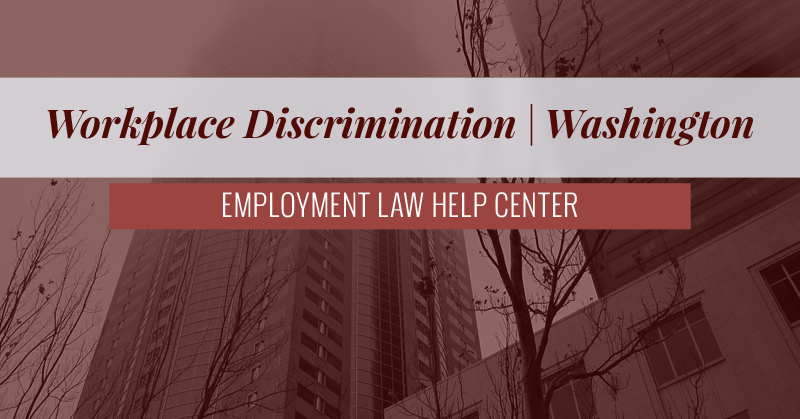Washington Workplace Discrimination
In Washington, as in all other states in the United States, workers are entitled to protection from discrimination in the workplace, in the form of harassment, discrimination or retaliation in hiring, firing (wrongful termination), wages, benefits and other employment decisions. Employees or job applicants who are discriminated against because of their membership in a protected class, or retaliated against for exercising their rights, may have grounds to file a workplace discrimination claim against their employer. Contact a knowledgeable Washington discrimination lawyer today to learn about your rights and discuss your options for legal recourse.

Protected Characteristics in Washington
Under state and federal anti-discrimination laws, it is against the law for employers in Washington to discriminate against a person or group of people at work on the basis of a protected characteristic, or a characteristic shared by a group of people who are legally protected from harassment or discrimination on the basis of that characteristic. The following are considered “protected characteristics” in the state of Washington:
- Race
- Creed
- Color
- Sex (including pregnancy)
- Age (40 or older)
- National origin
- Marital status
- Disability
- Use of a service animal
- Sexual orientation
- Gender identity
- Veteran or military status
- HIV/AIDS
Types of Workplace Discrimination
Workplace discrimination describes any employment decisions or practices that have a disproportionate adverse impact on members of a protected class. Under state and federal anti-discrimination laws, employers in Washington are prohibited from engaging in discrimination in any aspect of employment, including:
- Hiring and hiring
- Recruitment
- Compensation, assignment or classification of employees
- Transfer, layoff or promotion
- Fringe benefits
- Pay, retirement plans or disability leave
- Use of company facilities
- Other terms and conditions of employment

Harassment and Retaliation in the Workplace
A type of sex discrimination, sexual harassment violates Title VII of the Civil Rights Act of 1964, the primary federal anti-discrimination law that protects employees from discrimination on the basis of a protected characteristic. Sexual harassment is an issue that can affect men as well as women, and involves an employer or supervisor treating a person unfavorably because of his or her sex, whether the person is a current employee or is applying for a job. Sexual harassment is described as unwelcome sexual advances, requests for sexual favors, or other physical or verbal conduct of a sexual nature, and in some cases, the harasser may imply that submission to or refusal of the sexual conduct may be used as a basis for employment decisions, such as hiring, firing, benefits or promotion.
In addition to prohibiting sexual harassment in the workplace, Title VII of the Civil Rights Act of 1964 also forbids Washington employers from retaliating against employees for filing a charge of harassment or employment discrimination against themselves or another person at work. Furthermore, this federal law protects employees who participate in a harassment or discrimination investigation, proceeding or hearing, or who otherwise exercise their rights by filing a workers’ compensation claim, or by reporting illegal activity on the part of their employer (whistleblowing).
An Experienced WA Discrimination Lawyer Can Help
If you believe you have been discriminated against at work, you must first file a complaint with either the Washington State Human Rights Commission (WSHRC), the state administrative agency, or the Equal Employment Opportunity Commission (EEOC), the federal administrative agency, depending on how many employees your workplace has. If your case is not resolved by the WSHRC or EEOC, you may choose to pursue your claim in court, and hiring an attorney who has experience handling workplace discrimination claims in Washington is imperative to the success of your case. There are deadlines in place for filing an employment discrimination claim in the state of Washington, so do not delay in consulting with an attorney, as you may lose your opportunity to pursue a case against your employer.




